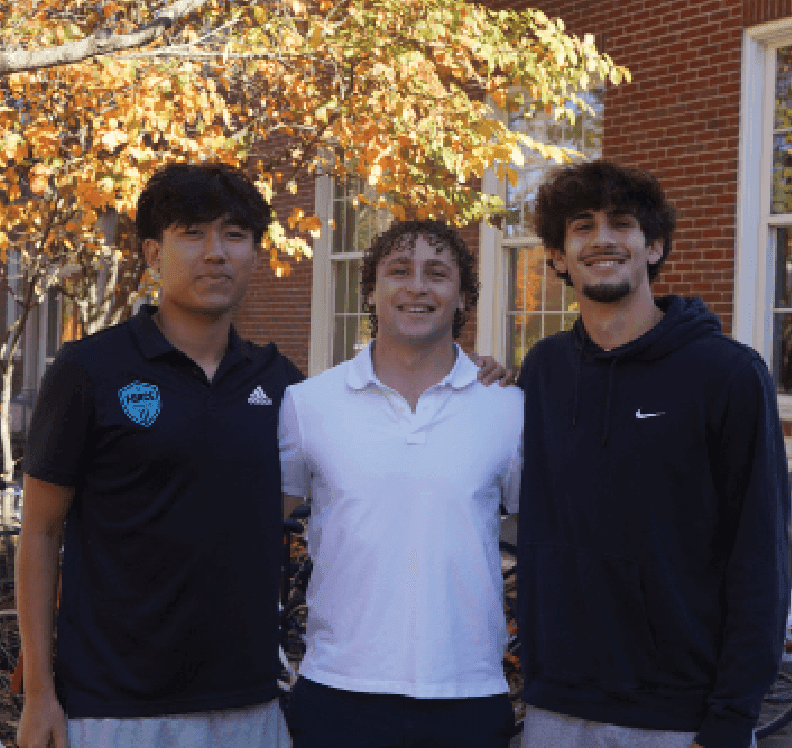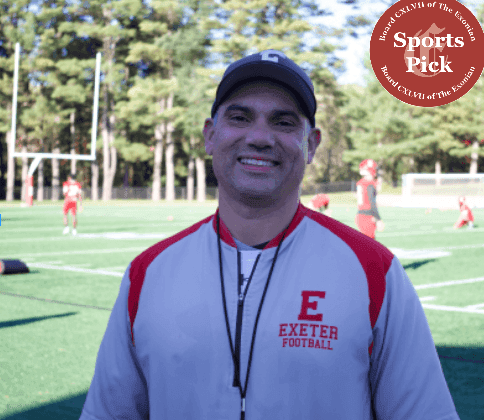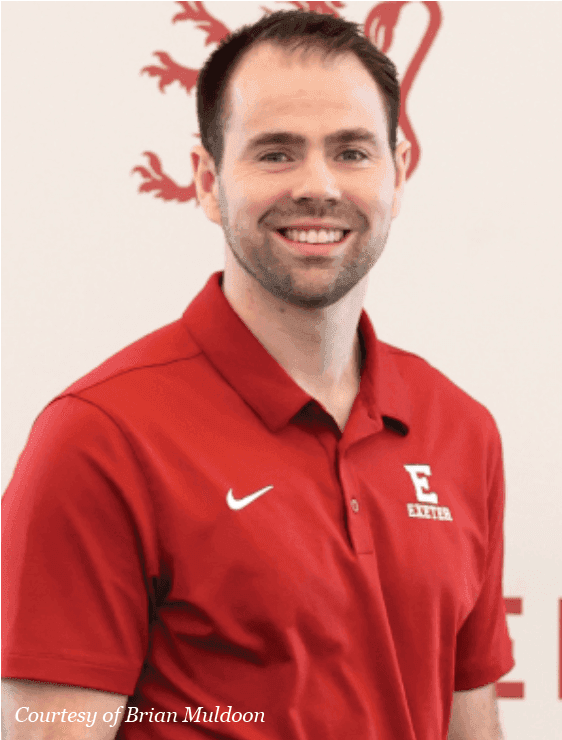By CARLY CANSECO, EILENA DING, ANGELA HE, and AVNI MURARKA
On some days, Love Gym feels like a battleground, where fast dodges turn into chaos, sneakers skid on the hardwood, and the echo of a coach’s whistle cuts through the noise. On other days, players show up to practice in costumes for a themed practice, laughing at each other’s silly hairstyles or outfits. Somewhere between these two extremes, the grueling drills and ridiculous outfits, the girls’ varsity basketball team is shaping its identity.
Beneath the workouts and beyond the scoreboard lies a culture of determination, camaraderie, and passion. Consisting of players with varying basketball experience, Exeter tenure, and grade, the team is led by head coach and Instructor in English Katie Brule, assistant coach Kerry McBrearty, and assistant coach Mireya Boutin. The coaches take on the challenge of sharpening skills and creating an environment that prioritizes growth and community.
For Brule, her relationship with basketball has been a lifelong journey that began with tears on the first day but then evolved into an everlasting love for the game. “I’ve played basketball ever since kindergarten,” she said. “I love the sport now, although on my first day in basketball, I cried, so it’s been a long journey. I played throughout high school, then continued to play in college, and I just really loved it.” Now, as a coach, she’s focused on helping her players develop the same connection with the game, not just as competitors, but as teammates.
Coming to Exeter has allowed Brule to enjoy both her passions. “I think being able to coach was a big part of why I wanted to teach out a place like Exeter. I wanted to be able to do both and not just be in the classroom. I love spending more time with the game and getting more people to fall in love with the game. I think it’s an inspiring, dynamic space. I’ve learned so much about it since I started coaching at Exeter, so I’m really happy I’m doing it.”
Most of the team comprises new varsity players, so the coaches have emphasized team cohesion and bonding. “I aim to foster a culture of continuous improvement and teamwork,” Boutin said. “We are always focused on improving daily, whether honing on a specific skill or improving our team dynamic.”
“There are two overarching things that I find important, particularly with this season,” Brule added. “The first one is knowing your worth, what you’re capable of doing, and what you bring to the team. It’s important to know that you have worth, even if you’re someone who doesn’t get a lot of minutes in the game, there’s still a lot that you can be doing. Secondly, I think work ethic is really important to me. You can get beat by a team, but I don’t want to lose to a team and walk away from a game thinking, ‘I could have done more.’”
The coaches emphasize the importance of working hard and together as a team. “Coach Brule talks to us about the effort a lot. Before a game, she tells us that we can win if we are the harder-working team,” lower Lynwoo Hong explained. “Coach once told our team that regardless of the scoreboard at the end of the game, if our efforts were 100 percent and we were playing consistently high intensity, that would be a win for us.”
“The most valuable lesson my coach taught me was that you don’t always have to be more skilled than the opponent,” prep Haylie Regan said, “But if you’re playing harder and want to win, you can.”
The coaches are working to build a team culture where players push themselves to their limits without losing their love for the game. “I think our coaches are skilled at figuring out what we have to do better and improve our game,” said lower Maya Hinrichson. “At halftime, they’re always very specific in three or two, one thing we must focus on to improve. But also, even before the game, they do a good job at observing the other team, figuring out their plays, and looking for ways that we can attack their weaknesses.”
“Our coaches help our team by teaching us and explaining everything we need to do to be successful,” said Regan.“They ensure we do our best every time we step on the court.”
Prep Sarika Agarwalla, though she is not playing this season due to an injury, similarly noted, “Our coaches put a lot of focus on playing as a single team. We won’t be able to succeed or be the best version of ourselves if we play selfishly and as an individual.”
The coaches emphasize off-court bonding as well. “Coach Brule is always coming up with little fun things for us to do,” upper Daniella Kalil noted. “This past week, we had a themed practice where we dressed up in our favorite Taylor Swift eras. Next week, we’re doing another themed practice and dressing up as something that starts with the letter of your first name. The coaches often plan little fun things for us to do. It’s serious, and we want to win, be serious, and practice, but they have a good balance of finding little things for us to do to keep bonding and remember to have fun because it’s still high school basketball.
On the court, the coaches rigorously train the athletes, preparing them mentally and physically for games. However, they balance this rigor with compassion and openness, resulting in the comfort of several athletes. “Our coaches help our team by not sucking the joy out of a sport,” upper Quinn Dabney said. “I’ve had experiences with coaches in different sports, but where the coach just doesn’t make the sport fun, and it’s gotten to the point where I just never wanted to go to practice because I was afraid of messing up or making mistakes. Here, the coaches emphasize that it is okay to make mistakes because mistakes are how you grow.”
“I think that’s what makes our coaches so great. They focus on individuals and the broader team,” Hinrichson said. “It’s the small moments in practice, like when we’re doing a finishing drill, and Coach Brule is under the hoop with a pad, helping us one-on-one. She’ll tell us, ‘Fix this, jump off both feet and ram your arm into me instead of your shoulder.’ Those little details make a big difference.”
The girls’ varsity basketball team shines as an extremely close-knit community. The coaches highly emphasize the importance of teamwork and a strong work ethic while still having fun and enjoying practice. Basketball is a highly competitive sport, requiring hard work during practice and trying your best during games. However, what is indispensable to a team’s success is their collaboration and their community. Brule concluded, “You have to make sure that when we’re off the court and out of those heated moments, everyone feels comfortable, seen, supported, and loved.”

























